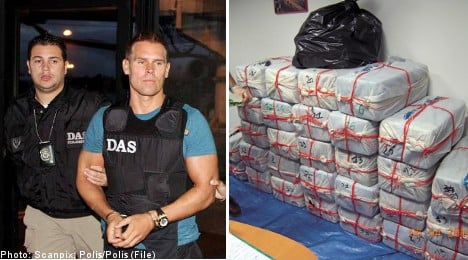The eight people, whose names were not given, were charged with aggravated narcotics crime, drug smuggling and money laundering for crimes committed between 2006 and 2010, Sweden’s international prosecution authority said in a statement on Monday.
The crimes, which took place between 2006 and 2010, were picked up on during a record drug bust in June 2010 on a sailboat off Martinique when a 56-year-old sailor was arrested with a 1.4 ton cargo of cocaine.
Jonas Oredsson, a 39-year-old Swede, is believed to be the mastermind behind the trafficking, but he is known to have had help from several people, including his 58-year-old mother.
The investigation has been ongoing for three years, and Swedish police have had help from police in the US, Colombia and France, as well as extensive cooperation with European Union agencies Eurojust and Europol.
“That police and prosecutors were able to cooperate over national borders was a prerequisite for getting this far,” Karin Bergstrand at the international prosecution authority said in the statement.
Oredsson has a lengthy history of criminal activities, including several counts of bank robbery in eastern Sweden, one of which he took a cashier hostage.
He is also known for his escapes from authorities, once being taken by masked and gun wielding men from a correction centre, and once from a court by a man on a motorcycle after having just been sentenced to 12 years prison.
The Oredsson’s mother is charged with having hidden 26 million kronor in a foundation in Switzerland.
The criminal network is known to have spent 115 million kronor between 2007 and 2010, including the purchasing of houses and boats in up to five different countries. Members of the group are also charged with money laundering in Spain.
“This is a hard blow to organized crime and shows that cooperation is the right way to hit the criminals where it hurts the most, by taking their money,” Klas Friberg, the head of Sweden’s national crime unit, said in the statement.



 Please whitelist us to continue reading.
Please whitelist us to continue reading.
Member comments